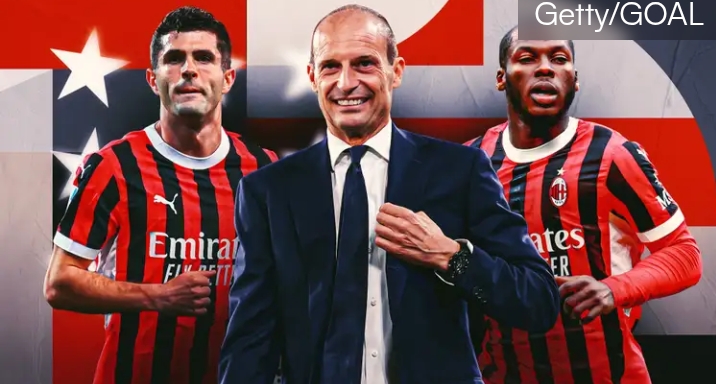Reaction to Massimiliano Allegri’s reported return as Milan manager was largely met with one reaction: “Oh boy.” Anyone who has followed Allegri-ball knows what it looks like – it doesn’t tend to be particularly exciting.
The fact is, though, that, in the club’s current iteration, Milan can’t afford to be flashy. What they need is what Allegri does bring to any team he coaches: results.
It’s a results-oriented business, so while the manner in which Allegri achieves those results isn’t always the prettiest, he does tend to get them. Milan finished in eighth in Serie A this season, missing out on Europe entirely. The 57-year-old is reportedly agreeing to a two-year deal with the Rossoneri, and he’ll take over a Milan team that needs wins next season, period.
For American fans, though, there are other questions. Christian Pulisic was one of the few bright spots for Milan this season, emerging as one of the most dominant attackers in Serie A. He led Milan in both goals and assists and is now widely expected to be a key figure in Allegri’s front line.
However, considering he’ll now be playing for a coach that favors pragmatism over flow, what could a Pulisic-led Milan look like next season?
On the flip side is Yunus Musah. Multiple Milan managers have failed to really unlock the U.S. international as he remains a midfielder with a lot of skills, but without a defined role. Ultimately, that has kept him from taking a big leap. Is Allegri the man who can ultimately help Musah discover who he can be?
Even with the wealth of legendary figures in Italian soccer, few coaches have done it better than Allegri. The winner of six league titles, five Coppa Italia trophies and three Supercoppa Italiana trophies, Allegri has cemented his place among the greats.
After spending the first seven years of his career managing smaller sides throughout the levels of the Italian game, Allegri took charge of Milan originally in 2010, remaining with the club for four years. He won the league in his first season, the club’s first in six years, instantly cementing himself as the man in Milan.
His stint wasn’t without a few mishaps, though, as his infamous misread of Andrea Pirlo’s later career led the midfielder to join Juventus, kickstarting the Old Lady’s run of dominance atop the Italian game.
Allegri, as it turns out, was a key figure in that dominance himself. He joined Juve in 2014 and won 11 trophies, headlined by a run of five consecutive league titles. In addition, the club reached two Champions League finals, but ran into Spanish buzzsaws Barcelona and Real Madrid to lose both.
After stepping away in 2019, he returned to the bench in Turin in 2021, but that tenure was far less successful. Juve, quite simply, weren’t on the same timeline as Allegri, and he was sacked just days after winning the Coppa Italia in 2024.
Now, he’s returned to Milan, looking to help return the club to its former glory, much like he did 15 years ago.
Allegri isn’t exactly known for free-flowing, high-octane soccer. This isn’t Jurgen Klopp’s heavy metal, by any stretch. No, Allegri-ball is pure, old-school pragmatism – and by and large, it’s worked.
The base of every Allegri team is built on defense, which could certainly help this Milan team. Milan conceded 43 goals, about middle of the pack, but it’s clear they would have been in a much better place if they had surrendered just a few fewer down the stretch.
Tactically, Allegri has generally shown a willingness to adapt to the team he has. He began at Juve with the team’s trademark 3-5-2, but he wasn’t afraid to make the big switch to a four-at-the-back system when the time called for it.
Many times, he would begin games in a 4-3-3 or a 4-3-1-2 before then reverting to old reliable three-at-the-back to see out victories, keeping lines tight and offering passing outlets when his side did have the ball. Allegri, generally, asks for calm in protecting a lead, not for the ambition of going to tack onto it.
That fact wasn’t criticized often during this glory days at Juve but, during his second stint, Allegri came under fire for being too risk-averse. When the results stopped coming, Allegri’s critics hit out at the aesthetics of his game, one which can quickly get a bit boring if his side doesn’t have the individual quality to create the moments that define a game.

